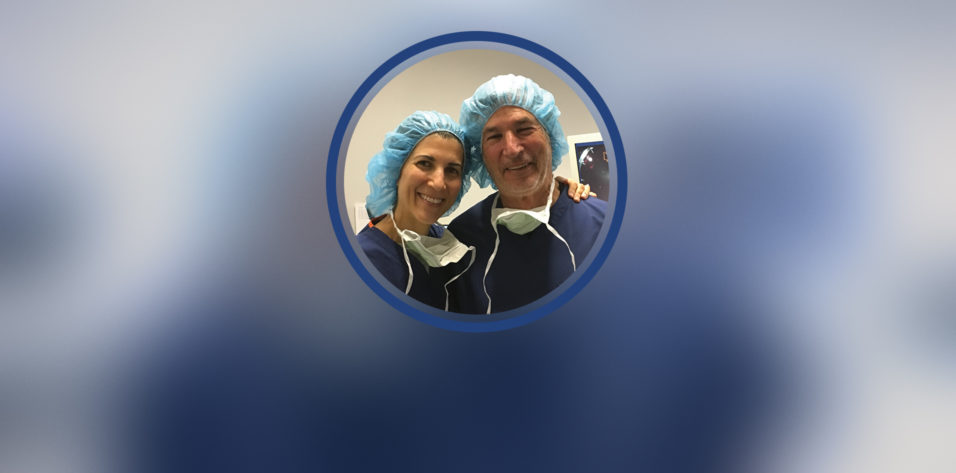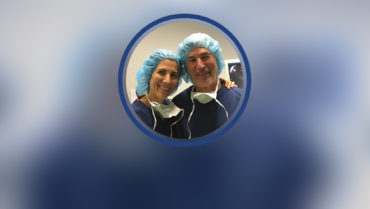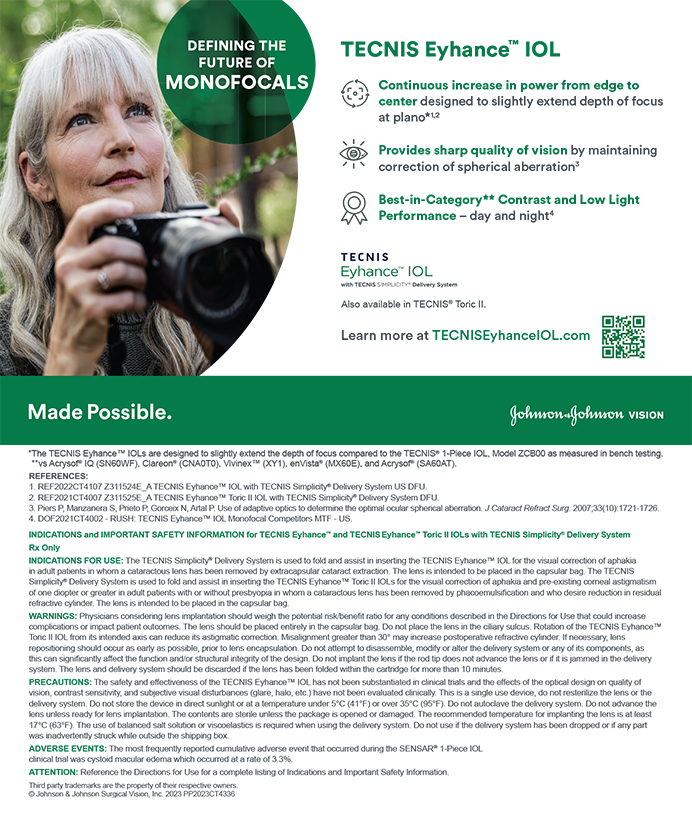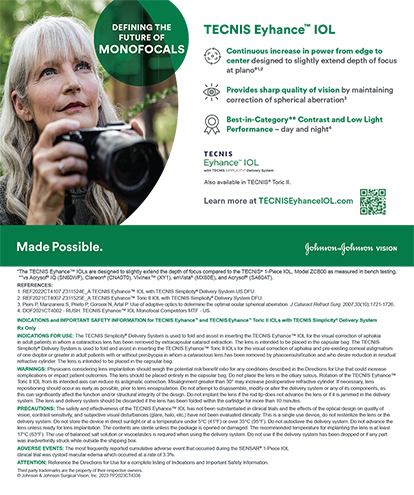Don’t Call Me Dad … In the Office
By Michael Gordon, MD
I am frequently asked what it is like to have my daughter working with me in my practice (Figure 1). First of all, it is a never-ending source of pride for me to watch her work, to see her interact with patients and staff, and to realize this is the same little girl I tucked in at night with her Care Bear.
When Alison was in medical school, she would ask, “How do you know what specialty you want to do?” My answer was to choose something you love but also to consider the lifestyle that specialty will afford you, regarding time for self and family.
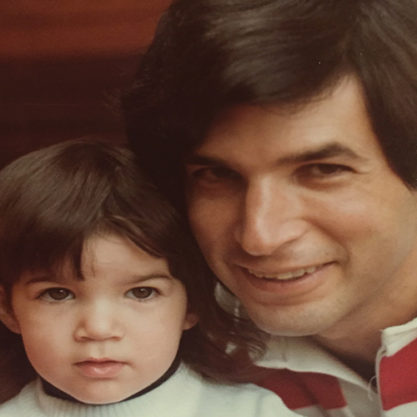
I never pushed Alison to ophthalmology. She was able to see my love of what I did and the fact that I had time to be home for dinner most nights and attend all the sporting events, piano recitals, and dance performances that are important to a young, growing family. That time is something you can never get back; you can always earn more money, but you cannot earn time.
When Ali finished her residency, she joined our practice as a fellow in refractive surgery for 1 year. It was obvious that she was a talented surgeon, that she had a great ability to communicate with patients, and that those patients loved her. My biggest challenge was to try to get her not to call me Dad in the office.
THE FINER SUBTLETIES
The payoff has not been only one-way. As much as I have taught Alison about refractive surgery she has taught me about cataract surgery. Like many of my refractive surgery colleagues, I had given up doing lens surgery in 1999 because my LASIK practice was busy. I was so focused on LASIK and clinical trials that cataract and lens-based surgery made no sense, time-wise or financially. More recently, changes in the market and demographics and the advent of laser cataract surgery intrigued me to get back in the saddle. I went to observe Amar Argarwal, MS, FRCS, FRCOphth, in Chennai, India, and honed my skills. Alison has been there next to me for this reintroduction, assisting and teaching me some of the finer subtleties of cataract surgery that I either had forgotten or never knew.
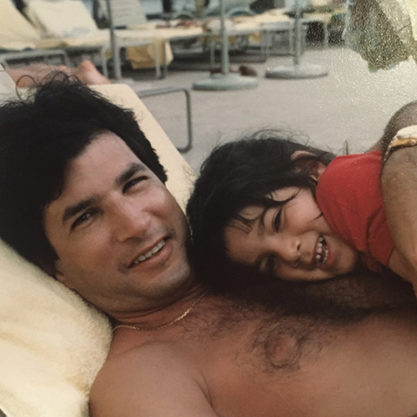
I love working with my daughter. It is a dynamic that you cannot have with a partner or a colleague; the DNA is an unbreakable, indescribable bond. I have three children, all of whom I could not be more proud of, but the dynamic of having one of them choose to follow my own profession is certainly unique, wonderful, and fulfilling. Alison is now the third generation of ophthalmologists in our family, as my wife’s father was also an ophthalmologist. It has been rewarding for me to be part of this process and interesting to watch her grow and mature as an ophthalmic surgeon and as a woman who is now married with a full life outside of ophthalmology. Who knows? With six grandchildren now, maybe there will be a fourth generation of ophthalmologists in the family.
From Stuffing Envelopes to pursuing Ophthalmology
By Alison Gordon, MD
I have been interested in medicine for as long as I can remember. I always loved science, and I always enjoyed examining things (I asked for a microscope and slides for my 5th birthday), the intricacies of doing things with my hands, and relating to people. As I went through school, it became more cemented in my mind that pursuing a career in medicine would allow me to follow the passions that I enjoyed and found interesting while also being able to have daily interactions and relationships with people.
Of course, another huge influence on my decision, and the most important, was my admiration and respect for my father. I would go to work with him at the office when I was young—mainly stuffing envelopes—but it still felt important.
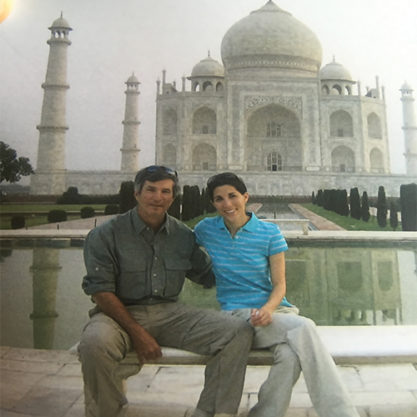
I loved seeing my dad in action. It felt so special to be able to go with him to the office and watch him seeing patients. The fact that he obviously enjoyed what he did, and still had the time to be home for dinner every night and be at all of my events and those of my siblings, also demonstrated that his career was one that allowed him a nice balance with family life.
When I began my medical school training, however, I really did not know what field I wanted to pursue, and I seemed to enjoy every rotation. I knew I wanted to practice in a surgical field, but which one? I liked figuring out systemic issues in internal medicine by putting various symptoms and signs together; I found neurology fascinating, and I also enjoyed pediatrics and many other areas. People often assume that my father pushed me into ophthalmology, but that was never the case; he always encouraged me to do what made me happiest and allowed a nice life balance.
In my third year of medical school, I did an ophthalmology rotation, and it seemed to combine all the elements of what I was looking for: surgery, medicine (systemic diseases that manifest in the eye), pediatrics, and neurology, to name a few.
EXPRESSIONS OF THANKS
The fact that I had watched my father enjoy his profession, one that was always on the cutting edge of exciting new developments, helped cement my decision to pursue an ophthalmology residency. Additionally, ophthalmology offers a humbling opportunity to dramatically affect the lives of patients by improving their vision. Oftentimes, I witnessed this firsthand when I would meet my father’s grateful patients. Sometimes, one of them would just come up to us in a restaurant and start thanking him profusely. This always made me so proud of him. I wanted to be able to positively affect people’s lives in this way as well.
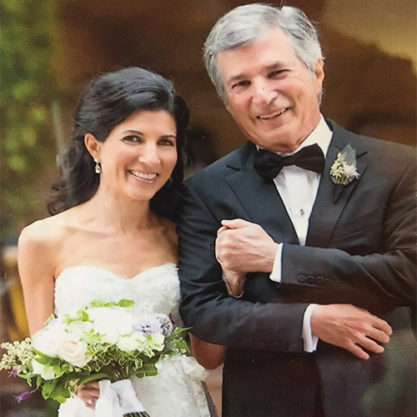
Throughout my residency training at the California Pacific Medical Center in San Francisco, I would discuss what I was learning with my father. When I completed my first cataract surgery, he was so excited for me. I quickly began to realize even more what a true pioneer in the field he has been. I was not sure that I wanted to focus on cataract and refractive surgery until the end of my residency, when I had more elective time to devote to it.
Initially, I thought I might want to stay up in the San Francisco Bay Area to practice, but when Dad and I discussed the possibility of my coming to work with him and the other doctors at the Gordon Schanzlin New Vision Institute, it was too good to pass up. I would be able to work alongside my father/mentor and be a part of a practice that was always on the forefront of new technology and renowned worldwide.
I must say I have never second-guessed my decision since beginning my career here. Being able to learn from the best of the best (who happens to be my amazing dad) and work with doctors and staff who make this such a successful and unique practice has been a pleasure and privilege.
SHARED PASSION
I love working with my father. Being able to see him every day has added an even stronger bond to our relationship, and I am so grateful, as most daughters do not have this opportunity. As a colleague, I am able to go to him with questions, and once in a while, I can offer him some useful tips, too. I am always impressed with his knowledge and skill base. He has been a principal investigator for many studies and is an expert in his field. I am proud when I see him speak at a conference and share his passion for what we do.
I love being able to bounce ideas off him or discuss a complicated or interesting case while we are in clinic. We often operate together, and when there is a challenging cataract case in the OR, we are able to help each other and offer advice on how best to handle it. There is always fun and humorous banter between us on a daily basis, whether in clinic or surgery.
Aside from my father’s unmatched knowledge and skill, he has the greatest integrity, empathy, and dedication to his profession and patients. I look up to him as a model of the ophthalmologist and person I hope to emulate. I cannot put into words how lucky I feel to be able to work alongside my father every day. I hope to make him even just a fraction as proud of me as I am of him.

